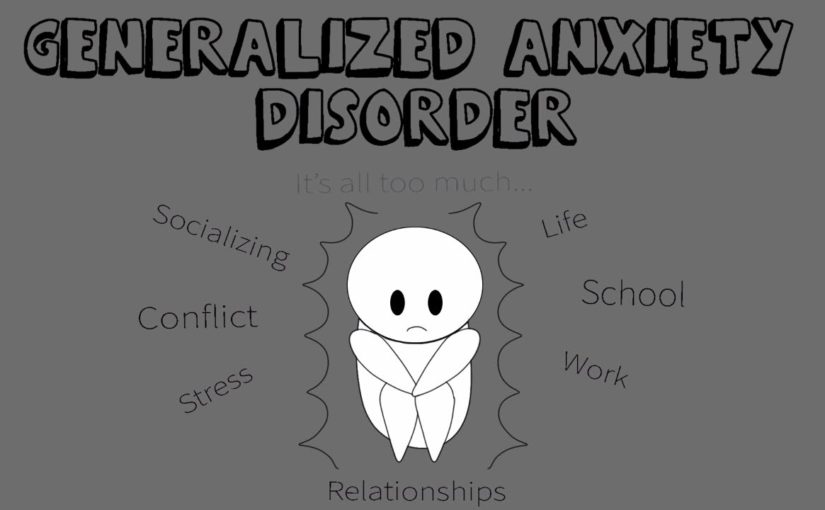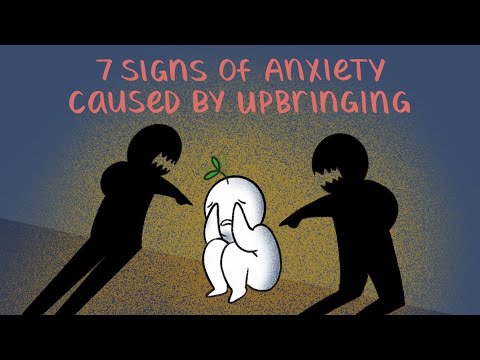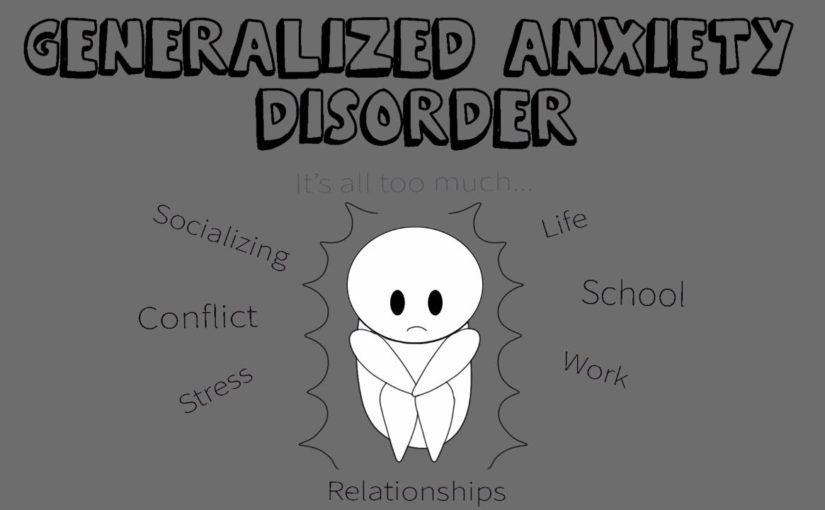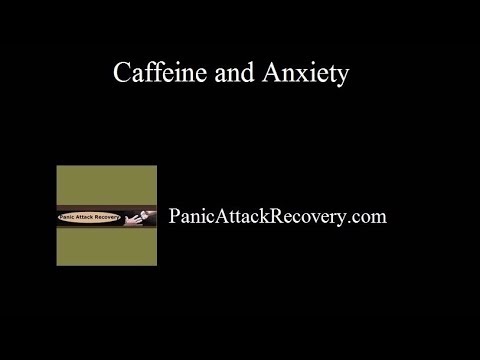Hi, I m Lynette from
PanicAttackRecovery com. We are a collaboration of former sufferers who are helping current sufferers of anxiety, panic attacks, and agoraphobia. If you are a consumer of caffeine and a panic, attack, or anxiety sufferer, then you might consider this video to be an important one, To begin with. What are the effects of caffeine, Caffeine s effects include stimulation of the central nervous system, CNS, and stimulation of the cardiac muscle. It has been suggested that caffeine can lead to jitters, headaches, irritability, confusion, muscle, aches, heartburn, increased blood pressure, and other effects on the body. However, you might be asking the following question: is there any real connection between caffeine and anxiety, Authors of an article in the Journal of Caffeine Research completed a thorough literature review. The authors indicated that their review showed that caffeine produces behavioral and physiological effects similar to those produced by other drugs of dependence. The article points out that caffeine consumption has been associated with several negative health consequences, including anxiety, insomnia, hypertension, myocardial infarction, bladder instability, gastroesophageal reflux spontaneous abortion, and reduced fetal growth. So should you consume caffeine, You might be able to consume caffeine in moderation. However, it s important to become aware of all of the foods and drinks that contain caffeine and to consider the level of caffeine in each of these foods and drinks, For instance, consider the following caffeine levels: according to the Mayo Clinic Brewed cup 8 oz of coffee 95 200 mg Cola, 30 40 mg, Black tea, 14 61 mg Energy drinks, such as Red Bull, 80 mg. The Mayo Clinic indicates that you might consider reducing your intake of caffeine if you are consuming more than 500 mg of caffeine per day. However, ultimately, we would suggest that you may want to determine your tolerance levels to caffeine. We certainly don t recommend that you quit caffeine or cold turkey. If you are trying to quit, If you are trying to cut back, you should gradually reduce your caffeine intake levels. Instead of making big changes all of a sudden, You should remember that caffeine is a drug, so you may initially go through some withdrawal symptoms when levels are reduced.

Withdrawal symptoms have been reported, such as headache, irritability, sleeplessness, confusion, nausea, restlessness, tremor palpitations, and raised blood pressure. You might be asking how to kick the caffeine habit or reduce the amount of coffee you consume. We would suggest you may want to think about two things. 1 Become aware of all your sources of caffeine by taking an inventory of all of your caffeine levels and 2. Consider substituting green tea in place of all or some of your daily coffee. Why green tea? Although green tea, has some caffeine? It s not nearly as much as coffee As mentioned, while a brewed 8 oz cup of coffee can have about 95 200 mg of caffeine. Green tea has about 14 40 mg of caffeine. Only In addition to subscribing to our YouTube channel, you can visit our website and Sign up for our free email newsletter, Obtain a range of articles about panic, attacks, anxiety, and agoraphobia, and Follow us on Twitter and Facebook. By taking advantage of these options, you can be assured that you will not be missing out on any of our resources. Please visit our website at
PanicAttackRecovery com. .
As found on YouTubeThis solution reverses kidney disease! Guaranteed to be effective or your money back:
Beat kidney disease. Just by following a simple treatment plan, you can reverse kidney disease. No matter how old you are! Just listen to what people who have tried this solution have to say. “Thank God I came across your solution by accident! Dad’s kidney function decreased from 36% to 73% in just two months. He’s 90 years old! His doctor said people his age shouldn’t have kidneys that efficient!” Graeme Asham, QLD, Australia, And this… “No more dizzy spells! My creatinine has gone down from a staggering 1800 to 1100. My blood count has greatly improved and I’ve been taken off my blood pressure medication. Your solution works! ” Joe Taliana, 55, Malta Simply follow the scientifically backed solution and restore your kidneys, fast! =>
This solution reverses kidney disease! ←
https://www.facebook.com/100000332115031/videos/590895892954739/ яαℓρн ℓєαмαи
 As found on YouTubeI thought my anxiety disorder was for life… $49.⁰⁰ But I Discovered How Hundreds Of Former Anxiety Sufferers Melted Away Their Anxiety And Now Live Relaxed, Happy Lives – With No Trace Of Anxiety Or Depression At All! http://flywait.anxiety4.hop.clickbank.net We’ve seen so many people go anxiety-free that we have no hesitation in guaranteeing this program. So… If at any time within 60 days of you purchasing ‘Overthrowing Anxiety’, your anxiety hasn’t completely evaporated then you can have all your money back. No questions asked! You can do this for yourself today. You can start making a difference in your life right now. Click on the button below and you’ll receive your copy of Overthrowing Anxiety in just a few minutes. It’ll be one of the best decisions you’ve ever made – guaranteed! http://flywait.anxiety4.hop.clickbank.net
As found on YouTubeI thought my anxiety disorder was for life… $49.⁰⁰ But I Discovered How Hundreds Of Former Anxiety Sufferers Melted Away Their Anxiety And Now Live Relaxed, Happy Lives – With No Trace Of Anxiety Or Depression At All! http://flywait.anxiety4.hop.clickbank.net We’ve seen so many people go anxiety-free that we have no hesitation in guaranteeing this program. So… If at any time within 60 days of you purchasing ‘Overthrowing Anxiety’, your anxiety hasn’t completely evaporated then you can have all your money back. No questions asked! You can do this for yourself today. You can start making a difference in your life right now. Click on the button below and you’ll receive your copy of Overthrowing Anxiety in just a few minutes. It’ll be one of the best decisions you’ve ever made – guaranteed! http://flywait.anxiety4.hop.clickbank.net


 Conditioned by judgmental parents at an early age. You may struggle with worry and fear of what others think about you. Their emphasis is on the opinion of others instead of on social initiatives and family sociability. This may lead to social anxiety. #5 You are overly cautious. Did your parents tend to constantly check on you when you’re not around them? If you have overprotective parents,
there’s a chance that you may be overly cautious. This is because having overprotective parents may condition you at a young age to be wary of everything. It can lead to having a certain worry and fear of things that are unknown to you. Although it can be beneficial to be overly cautious at times. It can also lead to a lot of anxiety. #6 You fear relationships. Do you find yourself scared about forming relationships? This fear may have stemmed from growing up in a separated family. Since you may fear that your current relationships will end up with the same outcome. Having neglectful parents could also cause you to fear relationships… …because it could make you think that your partner will neglect you in the same way. And #7 You doubt yourself. Have you ever said to yourself… What if I’m doing it wrong? Or am I making a mistake? Your parents’ constant criticism of your ability…can result in you developing constant self-doubt as you grow up. This will also cause you to have a higher risk of developing anxiety disorders in childhood. Do you relate to any of these signs? Let us know in the comments below! If you find this video helpful… Be sure to like, subscribe, and share this video with those who might benefit from it. The references and studies used in this video are added in the description below. Thanks for reading and we’ll see you in the next video!
Conditioned by judgmental parents at an early age. You may struggle with worry and fear of what others think about you. Their emphasis is on the opinion of others instead of on social initiatives and family sociability. This may lead to social anxiety. #5 You are overly cautious. Did your parents tend to constantly check on you when you’re not around them? If you have overprotective parents,
there’s a chance that you may be overly cautious. This is because having overprotective parents may condition you at a young age to be wary of everything. It can lead to having a certain worry and fear of things that are unknown to you. Although it can be beneficial to be overly cautious at times. It can also lead to a lot of anxiety. #6 You fear relationships. Do you find yourself scared about forming relationships? This fear may have stemmed from growing up in a separated family. Since you may fear that your current relationships will end up with the same outcome. Having neglectful parents could also cause you to fear relationships… …because it could make you think that your partner will neglect you in the same way. And #7 You doubt yourself. Have you ever said to yourself… What if I’m doing it wrong? Or am I making a mistake? Your parents’ constant criticism of your ability…can result in you developing constant self-doubt as you grow up. This will also cause you to have a higher risk of developing anxiety disorders in childhood. Do you relate to any of these signs? Let us know in the comments below! If you find this video helpful… Be sure to like, subscribe, and share this video with those who might benefit from it. The references and studies used in this video are added in the description below. Thanks for reading and we’ll see you in the next video!



 Withdrawal symptoms have been reported, such as headache, irritability, sleeplessness, confusion, nausea, restlessness, tremor palpitations, and raised blood pressure. You might be asking how to kick the caffeine habit or reduce the amount of coffee you consume. We would suggest you may want to think about two things. 1 Become aware of all your sources of caffeine by taking an inventory of all of your caffeine levels and 2. Consider substituting green tea in place of all or some of your daily coffee. Why green tea? Although green tea, has some caffeine? It s not nearly as much as coffee As mentioned, while a brewed 8 oz cup of coffee can have about 95 200 mg of caffeine. Green tea has about 14 40 mg of caffeine. Only In addition to subscribing to our YouTube channel, you can visit our website and Sign up for our free email newsletter, Obtain a range of articles about panic, attacks, anxiety, and agoraphobia, and Follow us on Twitter and Facebook. By taking advantage of these options, you can be assured that you will not be missing out on any of our resources. Please visit our website at
Withdrawal symptoms have been reported, such as headache, irritability, sleeplessness, confusion, nausea, restlessness, tremor palpitations, and raised blood pressure. You might be asking how to kick the caffeine habit or reduce the amount of coffee you consume. We would suggest you may want to think about two things. 1 Become aware of all your sources of caffeine by taking an inventory of all of your caffeine levels and 2. Consider substituting green tea in place of all or some of your daily coffee. Why green tea? Although green tea, has some caffeine? It s not nearly as much as coffee As mentioned, while a brewed 8 oz cup of coffee can have about 95 200 mg of caffeine. Green tea has about 14 40 mg of caffeine. Only In addition to subscribing to our YouTube channel, you can visit our website and Sign up for our free email newsletter, Obtain a range of articles about panic, attacks, anxiety, and agoraphobia, and Follow us on Twitter and Facebook. By taking advantage of these options, you can be assured that you will not be missing out on any of our resources. Please visit our website at